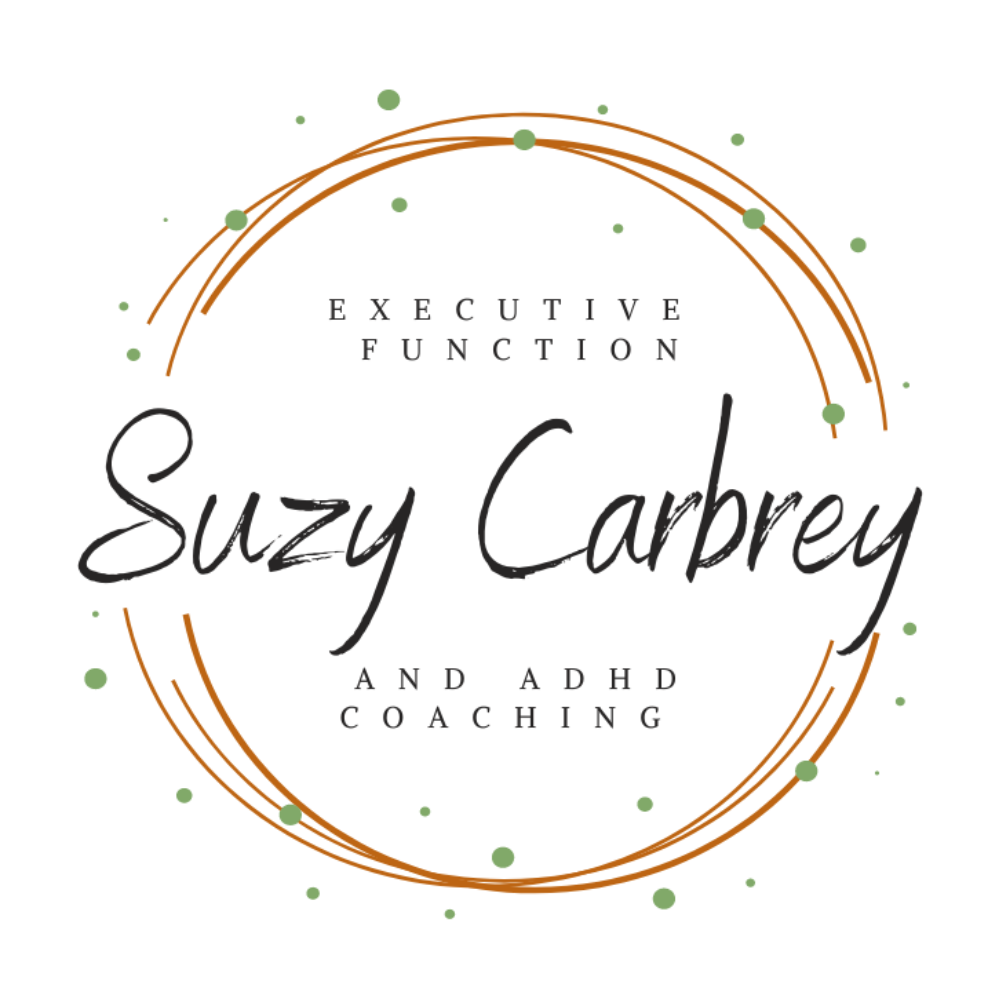The Power of Identity Shift is written by Suzy Carbrey
The Power of Identity Shift: Navigating the challenges of life with ADHD or executive functioning differences can feel like tackling hurdles on multiple fronts. However, there’s a powerful game-changer in the mix – the art of purposefully shifting your identity. This deliberate transformation isn’t just a catalyst; it’s a powerhouse move that unlocks your potential, paving the way for a life in sync with your goals and aspirations. In the realm of personal change, consider identity shift as the cornerstone – a foundational framework reshaping habits, behaviors, and ultimately, life outcomes. Let’s dive into the pivotal role of identity transformation in the following sections
Key Reasons Identity Shift Matters for Personal Change
Alignment with Goals:
Your identity shapes your beliefs, values, and self-perception. When you align your identity with your desired goals, it creates a sense of congruence. This alignment reinforces your commitment to those goals, making it more likely that you will take actions consistent with the person you aspire to be.

Consistency in Behavior:
People tend to behave in ways that are in harmony with their self-concept. If you perceive yourself as a proactive, goal-oriented individual, you are more likely to engage in behaviors that reflect those qualities. An identity shift creates a consistent narrative, making it easier to sustain positive changes over time.
Overcoming Limiting Beliefs:
Many individuals harbor limiting beliefs about their abilities and potential. An identity shift challenges and replaces these negative self-perceptions with a more empowering narrative. This shift in identity enables individuals to believe in their capacity for growth and change.
Motivation and Persistence:
When your identity aligns with your goals, it becomes a powerful source of motivation. The desire to maintain internal consistency encourages you to persist in the face of challenges. Your identity serves as a guiding force that propels you forward, even when obstacles arise.
Resilience in the Face of Setbacks:
Transforming your identity involves developing a growth mindset, where setbacks are seen as opportunities for learning and improvement. This resilient mindset helps you bounce back from failures, view challenges as temporary, and maintain focus on your long-term objectives.
Social Influence and Accountability:
When you communicate your identity shift to others, you create a social environment that supports your goals. Your friends, family, or colleagues can provide encouragement, hold you accountable, and reinforce the positive changes you are making.

Creating New Habits:
Habits are deeply intertwined with identity. By consciously shaping your identity, you can instill new habits that align with the person you want to become. Over time, these habits become ingrained, contributing to the overall transformation of your lifestyle.
Increased Self-Efficacy:
A shift in identity enhances your sense of self-efficacy—the belief in your ability to achieve goals. As you witness yourself making positive changes and achieving milestones, your confidence grows, reinforcing the perception that you are capable of creating the life you desire.

In essence, the power of identity shift provides a comprehensive and interconnected approach to personal change. It addresses the cognitive, emotional, and behavioral aspects of transformation, making it a powerful catalyst for achieving lasting and meaningful improvements in various areas of life.
Practical Steps To Help You Redefine Your Identity
Step 1: Self-Reflection
Begin the journey by engaging in deep self-reflection. Identify your strengths, weaknesses, passions, and values. Consider the aspects of your current identity that hinder your progress and those that support your goals. This understanding serves as the foundation for the strategic transformation you’re about to undertake.
Step 2: Set Clear Goals
Define your short-term and long-term goals. These goals should be specific, measurable, achievable, relevant, and time-bound (SMART). Creating a roadmap gives your identity transformation a purpose and direction, making it easier to stay focused.
Step 3: Develop Positive Habits
Habits play a crucial role in shaping our identity. Identify habits that align with your goals and foster positive change. Start small, focusing on one habit at a time to avoid overwhelming yourself. Consistency is key, so be patient with yourself as you work towards building new, constructive routines.

Step 4: Create a Support System
Surround yourself with a supportive network of friends, family, or mentors who understand and encourage your journey. Share your goals with them, and let them be a source of motivation and accountability. Having a strong support system can make the process of identity transformation more enjoyable and sustainable.
Step 5: Time Management Strategies
Managing time effectively is often a challenge for individuals with ADHD. Implement time management techniques such as breaking tasks into smaller steps, setting timers, and using visual aids to help you stay organized. By mastering your time, you can showcase your abilities and accomplishments more effectively.
Step 6: Embrace Failure as a Learning Opportunity
In the process of changing your identity, setbacks are inevitable. Instead of viewing them as failures, see them as valuable learning opportunities. Understand what went wrong, adjust your approach, and move forward with newfound knowledge and resilience. Celebrate your progress, no matter how small, and stay committed to your goals.
Step 7: Cultivate a Growth Mindset
Developing a growth mindset is essential for personal transformation. Embrace challenges as opportunities to grow, and believe in your ability to improve over time. By cultivating a growth mindset, you’ll become more adaptable and open to change, making it easier to shape your identity in a positive direction for the power of identity shift.
Avoiding the Willpower Trap
People tend to behave in ways that are in harmony with their self-concept. If you perceive yourself as a proactive, goal-oriented individual, you are more likely to engage in behaviors that reflect those qualities. The power of identity shift creates a consistent narrative, making it easier to sustain positive changes over time.

Understand the Limits of Willpower:
Recognize that willpower is not an infinite source of energy. The demands of daily life, coupled with the cognitive challenges you may face, can quickly deplete your willpower reserves. Acknowledge that sustainable change requires a comprehensive approach beyond sheer determination.
Build Supportive Systems:
Instead of depending solely on willpower, create systems and structures that support your goals. This might involve setting up reminders, using productivity tools, or establishing routines that minimize the need for constant decision-making. External supports can act as a buffer, reducing the strain on your willpower.
Design Your Environment:
Modify your environment to make desired behaviors more accessible and undesired ones less tempting. By shaping your surroundings, you reduce the need for constant resistance. For example, if you want to develop a reading habit, keep books within easy reach, creating an environment conducive to your goal.
Break Tasks into Manageable Steps:
Overwhelming tasks can quickly deplete your willpower. Break down your goals into smaller, more manageable steps. This not only makes the process less daunting but also reduces the mental effort required, minimizing the strain on your willpower.
Establish Habits and Rituals:
Cultivate habits and rituals that automate positive behaviors. Habits, once ingrained, require less conscious effort, allowing you to conserve willpower for other challenges. Consistency in routine can be a powerful ally in your journey toward positive change.
Celebrate Small Wins:
Acknowledge and celebrate the small victories along the way. Each accomplishment, no matter how minor, boosts your confidence and motivation. By recognizing your progress, you reinforce positive behaviors and create a positive feedback loop that doesn’t solely rely on willpower.
Seek Accountability:
Engage with a supportive network or accountability partner. Sharing your goals and progress with others provides external motivation and encouragement. Knowing that someone else is aware of your objectives adds a layer of responsibility beyond sheer willpower.
By incorporating these strategies, you shift the focus from depending solely on willpower to creating an environment and mindset conducive to lasting change. Remember, a holistic approach that considers your unique challenges and strengths will pave the way for a more sustainable and effective transformation with the power of identity shift.
Conclusion
In the realm of personal and professional growth, strategically reshaping your identity emerges as a potent tool, particularly for adults dealing with ADHD or executive functioning challenges. By engaging in self-reflection, setting clear goals, nurturing positive habits, building a robust support system, mastering time management, embracing setbacks as learning opportunities, and fostering a growth mindset, you pave the way to redefine yourself and present your best self in life. Keep in mind, that this journey is as unique as you are. So, approach it with patience and self-compassion. With unwavering dedication and perseverance, you hold the potential to unlock a more fulfilling and successful version of yourself and the power of identity shift.

Learn more about The Power of Identity Shift with Online Coaching for Executive Functioning / ADHD
Ready to gain control and enhance your executive functioning? As an experienced and compassionate coach, I specialize in providing support for executive functioning and ADHD. To embark on your journey, please reach out to me at 708-264-2899 or email hello@suzycarbrey.com to schedule a FREE 20-minute discovery call consultation.
With a background as a speech-language pathologist, I have a strong foundation in executive functioning coaching. My graduate degree program in SLP placed a significant emphasis on cognition, including executive functions, and I have years of experience in medical rehabilitation, providing cognitive-communication therapy. Additionally, I have completed an ADHD Services Provider certification program, I am Solutions-Focused Brief Therapy Diamond Level 1 certified and I am trained in the Seeing My Time® executive functioning curriculum.
Experience the convenience and effectiveness of online coaching, backed by studies that demonstrate equal results to in-person services. Parents, professionals, and emerging adults love the convenience and privacy of receiving coaching from their own homes.
Whether you reside in Chicago, Milwaukee, Indianapolis, Kansas City, or anywhere else around the globe, I am here to assist you. Schedule your discovery call consultation today, and I eagerly anticipate the opportunity to work with you!
Please note that although I am a certified speech-language pathologist, all services Suzy Carbrey LLC provides are strictly coaching and do not involve clinical evaluation or treatment services. If you require a formal speech therapy evaluation and treatment, please inform me, and I can provide appropriate recommendations.

